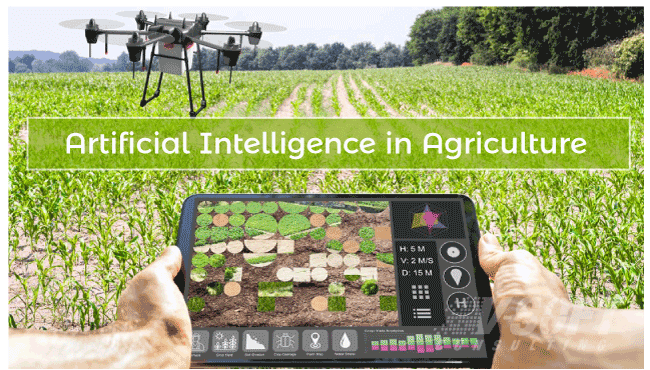Artificial Intelligence (AI) has rapidly transformed many industries, and agriculture is no exception. Farmers have always relied on technology to make their operations more efficient, but AI has the potential to revolutionize the way we produce food.
How does it work? AI involves using computers to do things that traditionally require human intelligence. This means creating algorithms to classify, analyze, and draw predictions from data. It also involves acting on data, learning from new data, and improving over time. Just like a tiny human child growing up into a (sometimes) smarter human adult. And like humans, AI is not perfect. Yet.
In agriculture, one of the biggest advantages of AI is its ability to optimize crop yields. By using machine learning algorithms to analyze data about weather patterns, soil conditions, and other factors, farmers can make more informed decisions about planting, fertilizing, and harvesting crops. This can lead to higher yields and more consistent crop quality.
The growing use of information management systems and innovative technologies for enhancing agricultural yield utilizing deep learning techniques have also contributed to AI’s rise. Human resource management and financial investment are likely to also be greatly infuenced by these new AI-based technologies.
AI can also be used to reduce waste and improve sustainability in agriculture. For example, smart irrigation systems can use AI to determine when crops need water and how much to give them, reducing the amount of water that’s wasted. Similarly, AI-powered crop monitoring systems can detect pests and diseases early on.
The rising usage of smart sensors in agriculture is another key trend in agriculture-related AI. Thanks to sensor-based technology, farmers can now precisely map their fields, track crop treatment items, and administer them just where they are needed.
When you consider AI’s self-learning capacity, the increasing use of image analysis, and it’s predictive forecasting that will become more and more precise in the years to come, there is no doubt we are witnessing the emergence of a new paradyme in agriculture.
The next generation of farmers will have a huge head-start compared to their predecessors due to the fact they’ll be able to draw upon vast amounts of data and best practice that will save them both time and money and help them to avoid the usual pitfalls when starting a new business.
Obviously, in order to benefit from AI’s huge potential it has to be used correctly & intelligently, especially in the early stages. Once sufficient amounts of data have been fed into the operating system the AI will automatically start to look for ways to improve upon past performance and the self-learning aspect of the programmes will be auto generative.
To review, AI does indeed have the potential to revolutionize agriculture by making farming more efficient, sustainable, and profitable. While there are still challenges to be addressed, the use of AI in agriculture is likely to continue to grow in the coming years, transforming the way we produce food and meet the needs of a growing population.
Have you taken the AgTech Chatbot Challenge?

